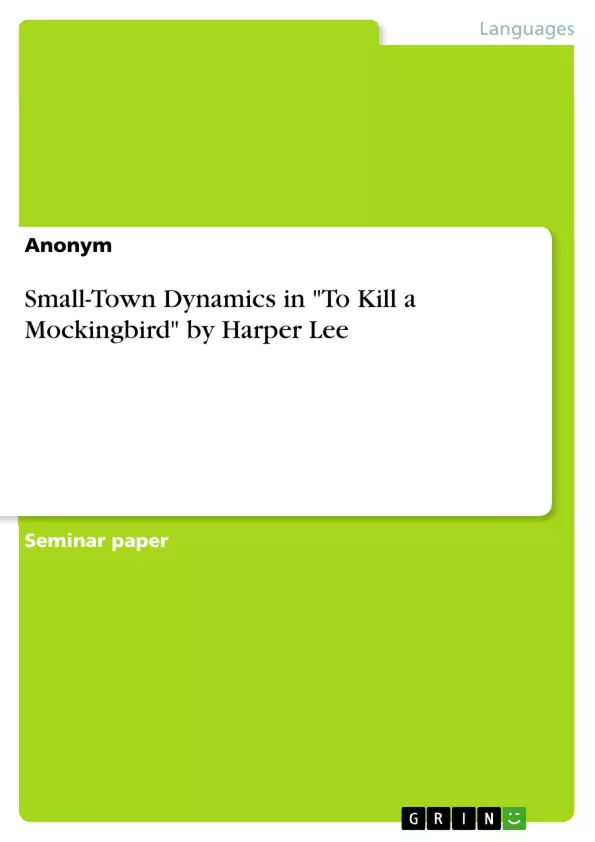"The novel To Kill a Mockingbird" was written by Harper Lee and published in 1960. It continues to be the second most assigned text in the U.S. (Macaluso 279) and thus, is widely known. Amongst many other themes and motives, the role of the small town and its dynamics seem to be largely influential.
This paper will consider the influence of small-town dynamics on the interpersonal relationships in "To Kill a Mockingbird", with a particular focus on the character Arthur “Boo” Radley and his family. To do this, first, the American small town is considered. In accordance with the reality of the book, the focus will be set on the historical present of the novel which are the 1930s and the U.S. South. Correspondingly, the characteristics and dynamics of the small town are addressed afterwards, focusing on social hierarchies and prejudices, rumours, the hush-hush mentality, and unspoken norms and standards. The final theoretical part focuses on the representation of small towns in literature. In the practical section, the small-town dynamic in "To Kill a Mockingbird" will be examined in more detail, using examples from the novel to analyse whether Maycomb can be considered a typical American small town.
Next, the question of the extent to which the Radley family can be aligned with small town etiquette will be examined, followed by a discussion of small-town virtues and their influence on Boo Radley and Scout Finch. The final section deals with the rumours surrounding Boo Radley. Through various examples, it will be shown that the small-town dynamic has a great impact on the interpersonal dynamics of the characters in Maycomb, especially in relation to the Radley family, and even influences those residents who would not typically act according to them. Overall, in keeping with the revolt from the village movement, Maycomb is portrayed in a way that highlights the drawbacks of small-town life.
Table of Contents
- Introduction
- The American Small Town
- Specific Small-Town Characteristics and Dynamics
- Social Hierarchies and Prejudices
- Gossip and the Hush-Hush Mentality
- Unspoken Norms and Standards
- Representation of Small Towns in Literature
- Specific Small-Town Characteristics and Dynamics
- Small Town Dynamics in To Kill a Mockingbird
- Maycomb as a Typical American Small Town
- The Radley Family and the Small-Town Etiquette
- Boo Radley, Scout Finch, and Small-Town Virtues
- Boo Radley and the Gossip Surrounding Him
Objectives and Key Themes
This paper aims to explore the influence of small-town dynamics on the interpersonal relationships in Harper Lee's To Kill a Mockingbird, particularly focusing on the character of Arthur "Boo" Radley and his family. It examines the historical present of the novel, the 1930s U.S. South, analyzing the specific characteristics and dynamics of small towns in this context, such as social hierarchies, prejudices, rumors, and unspoken norms.
- The impact of small-town dynamics on interpersonal relationships in To Kill a Mockingbird.
- The portrayal of Maycomb as a typical American small town.
- The role of the Radley family and their relationship with small-town etiquette.
- The influence of small-town virtues on characters like Boo Radley and Scout Finch.
- The impact of rumors and gossip on the perception of individuals within the small-town community.
Chapter Summaries
The introduction sets the stage by highlighting the enduring significance of To Kill a Mockingbird and its exploration of small-town dynamics. Chapter two delves into the American small town, emphasizing its unique social structure, characterized by close-knit communities, social hierarchies, and a reliance on gossip and unspoken rules. This chapter further examines the representation of small towns in literature.
Chapter three focuses on the dynamics of Maycomb, the fictional small town in To Kill a Mockingbird. It explores how Maycomb embodies the stereotypical characteristics of an American small town, examining the Radley family and their relationship with small-town etiquette, and highlighting the impact of small-town virtues on individuals like Boo Radley and Scout Finch. Finally, it delves into the rumors surrounding Boo Radley and their impact on his perception within the community.
Keywords
The central keywords and focus topics of this paper are: small town dynamics, interpersonal relationships, To Kill a Mockingbird, Arthur "Boo" Radley, Maycomb, social hierarchies, prejudices, gossip, hush-hush mentality, unspoken norms, small-town etiquette, small-town virtues, and rumors.
- Quote paper
- Anonym (Author), 2022, Small-Town Dynamics in "To Kill a Mockingbird" by Harper Lee, Munich, GRIN Verlag, https://www.grin.com/document/1319171



